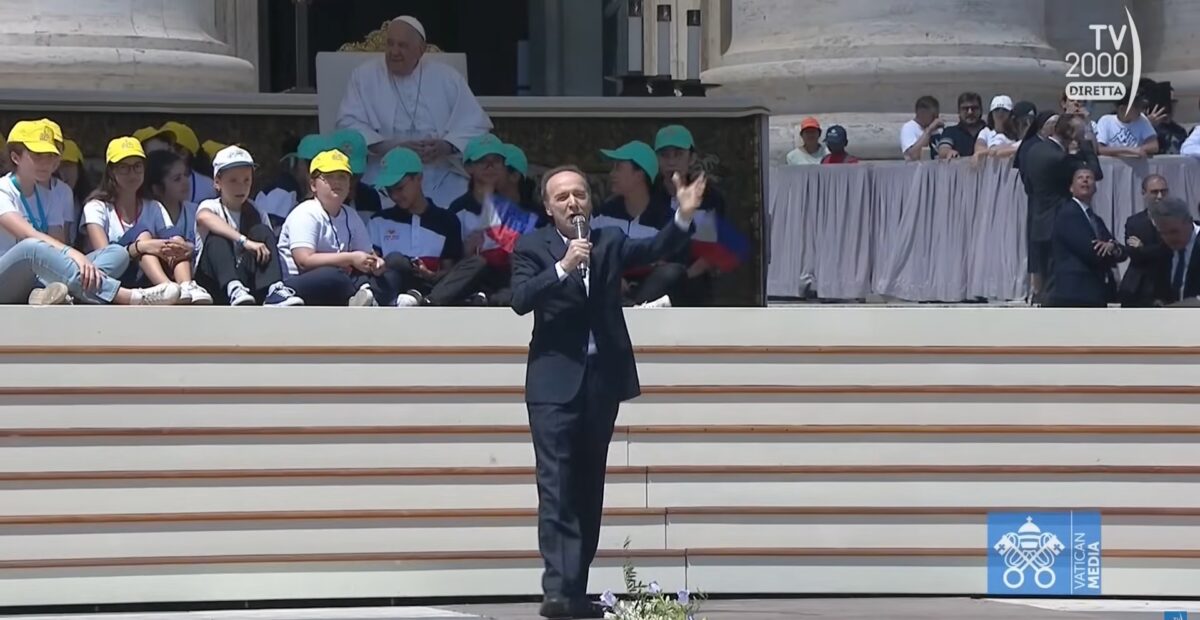
Watch
Smiles and poetry, Roberto Benigni

The story of the meeting held in Rome for World’s Children’s Day amongst Pope Francis, Roberto Benigni, and thousands of children gathered in St. Peter’s Square. A charm of words and healthy advice for the children as well as the adults. We tried summarizing it in this article.
In Roberto Benigni’s words on May 26th, reflect the values of hope and optimism. From his smile, at times subtle, often wide and constant, flower the capabilities of keeping at bay distrust and, worse, resignation. His 24 minutes on St. Peter’s parvis, with Pope Francis behind him and thousands of children in the square, are a regenerating song of serenity and positivity.
One feels the passing of God in the heart of the comedian; one breathes the miracle of the divine, the experience of the great encounter, and the very authentic sound of his words. In Benigni’s passion, there’s the fruit of that relationship incarnated in the pulsating desire to donate oneself to others. To offer them, firstly to the youngest, but not only, good news. To relieve our souls, always more disturbed by what happens in the world.
The Oscar Prize for “Life is Beautiful” talks about the future in a constructive way, optimistic beyond many problems. It urges that in the middle of the festive crowd in front of him, there can be the Michalengelos of tomorrow, the Galileos, and the Montalcinis. A Pope. He praises the very condition of childhood, which “looks with the heart,” and points out the path to the kingdom of heaven, a synonym of fullness and happiness, despite everything already on Earth.
He invites the children to dream, and he tells them how to: with their eyes open. By reading, observing, writing, inventing, and living life to the fullest “with all its emotions”. By learning “as many words as possible for our health”. As we are not fine if we do not have words that are fundamental instruments and sacred. “The most significant words that I have ever heard—remembers Benigni—Jesus said them.”
They are 24 minutes of sweet, gentle, cultured caresses, those brought to our faces by Benigni. For example, the fairy tales “are not necessary to remind the children that dragons exist, but that dragons can be defeated. Fairy tales can become reality. He quotes Gianni Rodari twice. Teacher.
He doesn’t lie, the irresistible Roberto: he does not avoid the complexity of life in his touching monologue. Filled with doubts, that yet do not have to scare us. Not even our insecurities. They are needed! As are the mistakes. Each story is unique. Each child must be himself, the “hero of his life,” and possibly “become the adult he would have wanted besides him as a child.” Just as every “adult should celebrate the children every day.”
It is important that each child must like what he does, enjoy himself, and does well what life calls him to do. And asks for help in the face of difficulty. “Take your life in your hands and make it a masterpiece—he clearly expresses—make the world beautiful.”
A sentence filled with the future and Christianity, as we are called to cultivate that earth, is also intended as the gift of life that has been given to us. A Christian, reminds us Benigni with his heartfelt speech, has the duty—that is also the pleasure—to think of the planet after him. It is a natural act of love, inherent in our human identity shaped by God.
The Vergaio actor lets “escape” that “we failed” reminder of how much work there is still to be done, how far behind we are, to make the world more united, more at peace, and freer. He explains with the simplicity and efficiency that make him exceptional how every life can “contribute towards the good or the bad.” To us, it is a choice and a duty to look at ourselves before others. To those whom we must try conveying “happiness,” he insists. Through our research for the good.
The elf of Vergaio urges the children, and obviously all of us, to be “sensible” and “deeply good,” as Jesus told us. To love, where “love is infinite compassion for the sufferings that humanity faces.” “Do not wait—he continues—for the world to take care of you, you take care of the world”.
The thought then goes to those who (often) rule the world today: “People who do not know what love is, who commit the most stupid sins. The war.” A “negative” word that “dirties everything”.
Thus, each one’s commitment is to try to “put an end to the war,” which means “the end of the game”.
Then a childish question, for this giant and correct. Necessary and painfully poetic: “Why do they not stop at the first child that is hurt?”. From poem to poem: that in the bitter and powerful verse of Eve Merriam: “I dream of giving light to a child that will ask me: mother, what is the war?”.
Then the light returns: “Amongst yourselves—the actor tries to reassure—there will be those who will find the “correct word to stop the war.” We must help you find it. We must do this with the stories that make you laugh.
The closing speech of a man who has preserved the enchantment, wonder, and playfulness of childhood is again laced with delicate and poignant poetry: “There is nothing more beautiful than the laughter of a child, and the day when all the children in the world laugh will be the most beautiful day in the history of the world”.






